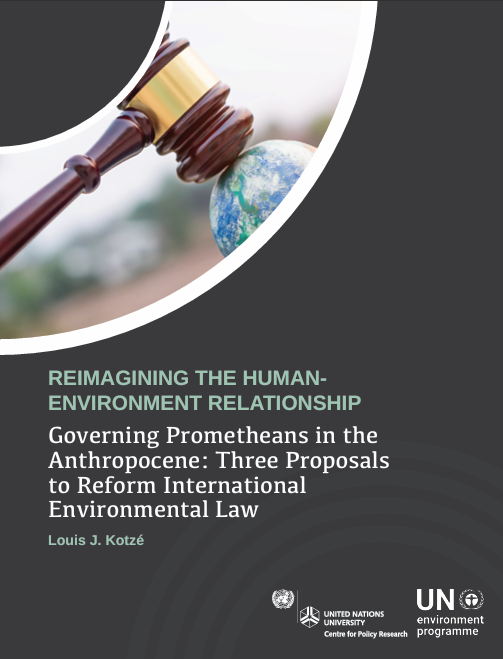Critically examines the current state and limitations of International Environmental Law (IEL) in addressing the complex challenges of the Anthropocene. The Anthropocene is characterized by significant human impact on Earth’s geology and ecosystems, presenting unique and severe challenges that require rethinking legal frameworks.
Key Themes and Proposals
- Reconceptualization of IEL: Argues that the existing IEL framework is inadequate for the realities of the Anthropocene. It is primarily designed under the assumptions of the Holocene, which considers environmental conditions stable and predictable. The Anthropocene, by contrast, is marked by dynamic and unpredictable changes, necessitating a more adaptive and responsive legal framework.
- Systematicity and Earth System Science: Proposes that IEL incorporate insights from Earth System Science to understand better and address the interconnectedness of global ecological processes. This approach would shift IEL from a traditionally anthropocentric focus towards a more holistic, ecocentric perspective that recognizes the intrinsic value of the Earth system.
- Normative Ambition and Ecocentric Approaches: Highlights the need for IEL to elevate its normative ambitions, advocating a shift from exploitation to conservation and sustainability. Kotzé suggests embracing alternative, ecocentric legal paradigms that prioritize the health of the planet and all its inhabitants over human-centered interests.
Overview
Part One
Explores the Anthropocene, a term by Nobel Laureate Paul Crutzen, denoting a new epoch marked by human activities’ significant impact on Earth. This era deviates from the stable Holocene conditions, previously the foundation for international environmental law. The Anthropocene transition necessitates a shift in International Environmental Law (IEL). Based on the Holocene’s presumed stability, the Anthropocene challenges the current law framework. It emphasizes the need for legal framework revisions to accommodate the Earth’s rapid changes.
Dr. Kotzé highlights the need for a new form of IEL in the Anthropocene to manage complex human-Earth system relations. This era requires an IEL reorientation to control Promethean humans, who can significantly affect the Earth system. It emphasizes the Anthropocene’s implications, setting the critical groundwork for examining IEL adaptation to this new era. Part One discusses current IEL shortcomings and proposes governance reforms to tackle the escalating Anthropocene crisis.
Part Two
Conducts a thorough analysis of the key failures of international environmental law (IEL) within the context of the Anthropocene, shedding light on critical areas where the current legal framework falls short in addressing the complex challenges posed by the era of rapid environmental change and human impact on the Earth system. Dr. Kotzé argues that IEL’s Earth system perspective, with its anthropocentric approach and fragmented environmental regulation, fails to address global governance challenges. It ignores environmental issues’ systemic, cross-boundary nature, which requires holistic solutions.
The critique underscores IEL’s human-centric bias, which favors economic growth over the environment and causes ecological harm, biodiversity loss, and social injustices. It often overlooks the rights of marginalized communities, indigenous peoples, and species affected by environmental degradation. The author criticizes IEL’s lack of ambition in tackling Anthropocene challenges.
Despite escalating environmental crises, IEL’s conservative approach receives criticism. The disconnect between IEL’s pace and environmental urgency highlights the need for more progressive legal approaches to address complex environmental issues in the Anthropocene. The dialogue emphasizes the need for IEL to shift its focus towards paradigms prioritizing planetary well-being, ecological integrity, and sustainability rather than solely human interests.
Part Three
Examines possible reforms for international environmental law (IEL) in light of Anthropocene challenges. Following a critique of current IEL failures, it suggests novel strategies to improve environmental governance effectiveness and adaptability amid fast-paced environmental change and human impact on the Earth system. It highlights IEL’s need for Earth system-based legal models for interconnected governance. Dr. Kotzé suggests Earth system science-inspired frameworks for Earth system protection and restoration. This approach promotes resilience and sustainability by emphasizing the link between social, ecological, and technological systems.
Highlights the integration of advanced science and indigenous wisdom into International Environmental Law (IEL). It updates laws to mirror Earth system understanding, converting scientific concepts such as the planetary boundaries framework into legal guidelines for eco-friendly human actions. The author emphasizes knowledge creation and collaboration in IEL’s future. Linking politics, science, and stakeholders like policymakers and indigenous communities, IEL can address environmental issues and regulatory gaps. This fosters innovation, resilience, and adaptability in the Anthropocene era.
Three Proposals for Transforming International Environmental Law
Introduces a framework for transforming international environmental law (IEL) for the Anthropocene era. The emphasis is on a paradigm shift towards holistic approaches prioritizing planetary health and sustainability over human-centric interests. Here’s an overview of the three interconnected proposals:
- Earth System Law: The first proposal emphasizes an Earth system approach in IEL to tackle governance challenges, stressing the interconnectedness of social, ecological, and technological systems for resilience and sustainability. Based on Earth system science, Earth system law could guide IEL beyond traditional anthropocentric environmental governance.
- Ecocentric-Oriented Approaches: The second proposal considers ecocentric strategies for Anthropocene environmental challenges. It values ecosystems and non-human entities, reducing human exploitation, and aims for a sustainable, balanced human-environment relationship.
- Ambitious Reformative Pathways: The third proposal highlights the need for IEL’s transformative change due to escalating environmental crises. Dr. Kotzé argues for reimagining legal approaches to tackle Anthropocene challenges and advocates a shift towards environmental governance that prioritizes socioecological resilience over neoliberal economic models.
Henceforth. Moreover. Nonetheless. Nevertheless. Therefore. Thus.




